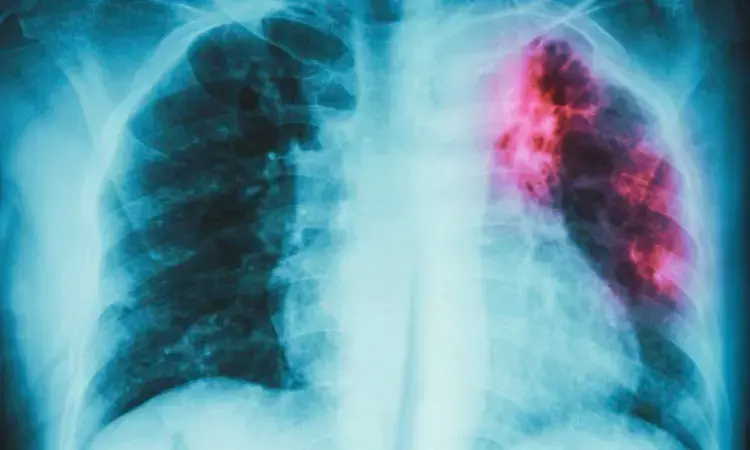- Home
- Medical news & Guidelines
- Anesthesiology
- Cardiology and CTVS
- Critical Care
- Dentistry
- Dermatology
- Diabetes and Endocrinology
- ENT
- Gastroenterology
- Medicine
- Nephrology
- Neurology
- Obstretics-Gynaecology
- Oncology
- Ophthalmology
- Orthopaedics
- Pediatrics-Neonatology
- Psychiatry
- Pulmonology
- Radiology
- Surgery
- Urology
- Laboratory Medicine
- Diet
- Nursing
- Paramedical
- Physiotherapy
- Health news
- Fact Check
- Bone Health Fact Check
- Brain Health Fact Check
- Cancer Related Fact Check
- Child Care Fact Check
- Dental and oral health fact check
- Diabetes and metabolic health fact check
- Diet and Nutrition Fact Check
- Eye and ENT Care Fact Check
- Fitness fact check
- Gut health fact check
- Heart health fact check
- Kidney health fact check
- Medical education fact check
- Men's health fact check
- Respiratory fact check
- Skin and hair care fact check
- Vaccine and Immunization fact check
- Women's health fact check
- AYUSH
- State News
- Andaman and Nicobar Islands
- Andhra Pradesh
- Arunachal Pradesh
- Assam
- Bihar
- Chandigarh
- Chattisgarh
- Dadra and Nagar Haveli
- Daman and Diu
- Delhi
- Goa
- Gujarat
- Haryana
- Himachal Pradesh
- Jammu & Kashmir
- Jharkhand
- Karnataka
- Kerala
- Ladakh
- Lakshadweep
- Madhya Pradesh
- Maharashtra
- Manipur
- Meghalaya
- Mizoram
- Nagaland
- Odisha
- Puducherry
- Punjab
- Rajasthan
- Sikkim
- Tamil Nadu
- Telangana
- Tripura
- Uttar Pradesh
- Uttrakhand
- West Bengal
- Medical Education
- Industry
Lung Function Impairment Associated with Increased TB Risk: Study Finds

South Korea: Researchers have found in a new study that individuals with obstructive or restrictive lung function impairment have a higher risk of developing tuberculosis (TB) compared to those with normal lung function. Further, the incidence of TB is inversely related to forced expiratory volume in one second (FEV₁), meaning that as FEV₁ decreases, the risk of TB increases. This suggests that reduced lung capacity may contribute significantly to vulnerability to TB infection.
The study, published in PLOS ONE, explored whether lung function at baseline could predict future TB incidence in the general population. While previous studies have established that pulmonary TB can lead to long-term damage and a reduction in lung capacity. However, little was known about whether pre-existing lung impairments might make individuals more susceptible to contracting TB in the first place.
To investigate this, Kyu Yean Kim, The Catholic University of Korea, Seoul, Republic of Korea, and colleagues conducted a large-scale, population-based cohort study using health data from South Korea. They analyzed records from the Korea National Health and Nutrition Examination Survey (KNHANES) and the National Health Insurance Service (NHIS) database, spanning 2010 to 2016. From a pool of over 29,000 individuals, 16,594 participants aged over 40 years who had undergone spirometry testing and had no prior TB history were included in the final analysis.
The study led to the following findings:
- During a median follow-up of 5.5 years, 72 participants were newly diagnosed with tuberculosis.
- Individuals with obstructive lung function impairment had over twice the risk of developing TB compared to those with normal lung function (aHR: 2.03).
- Those with restrictive lung function impairment also faced a significantly higher risk of TB (aHR: 2.19).
- Participants with lower FEV₁ values had a greater likelihood of developing TB, indicating an inverse relationship between lung capacity and TB risk.
- Individuals in the lowest FEV₁ quartile had nearly double the risk of TB compared to those in the highest quartile (aHR: 1.91).
- Those in the lowest FEV₁ decile had almost three times the TB risk compared to those in the highest decile (aHR: 2.76).
- The associations between reduced lung function and TB risk were statistically significant and consistent across subgroups.
The study sheds light on the potential role of impaired respiratory function as a contributing factor to TB susceptibility beyond traditional risk factors. It highlights the importance of monitoring lung health in populations at risk. It suggests that early detection of lung function decline could help identify individuals who may benefit from closer surveillance or preventive strategies for TB.
"These insights may have implications for public health screening programs, especially in countries with a high TB burden, and call for further research into targeted interventions for individuals with compromised lung function," the researchers concluded.
Reference:
Kim KY, Park Y-M, Ko SH, Han K, Kim SH, Kim SY, et al. (2025) Baseline lung function and risk of incident tuberculosis: a nationwide population-based cohort study. PLoS One 20(4): e0322616. https://doi.org/10.1371/journal.pone.0322616
Dr Kamal Kant Kohli-MBBS, DTCD- a chest specialist with more than 30 years of practice and a flair for writing clinical articles, Dr Kamal Kant Kohli joined Medical Dialogues as a Chief Editor of Medical News. Besides writing articles, as an editor, he proofreads and verifies all the medical content published on Medical Dialogues including those coming from journals, studies,medical conferences,guidelines etc. Email: drkohli@medicaldialogues.in. Contact no. 011-43720751


